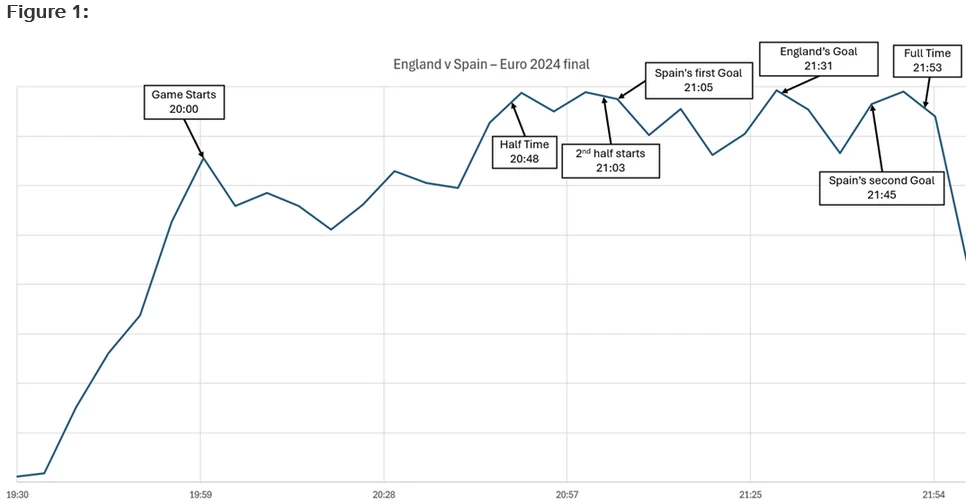Broadband ISP BT Sees Video Streaming Surge for England v Spain – Euro 2024

Telecoms giant BT has released some new internet traffic statistics from the final UEFA Euro 2024 football match between England and Spain (8pm) on Sunday 14th July 2024, which saw a 142% increase in customers streaming the game compared to England’s semi-final against the Netherlands.
Most of the big matches that involved England during Euro 2024 typically took place outside of normal working hours, which meant that many people ended up watching the action via a traditional TV broadcast rather than broadband (i.e. the event didn’t stress fixed line ISPs too much). But plenty of streaming did still take place.
The big demand from football fans also caused both the BBC and ITV to consistently break into the list of top 3 content providers across BT Group’s entire broadband network – with more people using these platforms than the likes of Netflix, Facebook and YouTube during home nations matches.
Advertisement
Apparently, the highest peak in broadband traffic during the final came as Cole Palmer equalised for England just after 9.30pm, although the chart that BT has provided is a little on the basic side.

The provider also noted that more than 11.5 million homes across the UK streamed at least one home nations match at Euro 2024 using BT Group’s broadband network. Scottish and English fans consumed more than 11,000 TB (TeraBytes) of broadband data in the last four weeks streaming their team’s matches, with download traffic from the BBC or ITV more than 30 times higher than an average week.
Outside of the final, England’s perfect penalties against Switzerland in the quarter-final – in which Palmer, Toney, Bellingham, Saka, and Alexander-Arnold all scored – was the next individual moment with the highest peak in broadband traffic out of all the home nations games.
Advertisement
Greg McCall, Chief Network Officer at BT Group, said:
“History was made last night. While Southgate’s men were proudly tackling the challenge on the pitch, our broadband network stood up to the challenge off it – seamlessly streaming one of the most anticipated events in years to homes in every corner of the country.
It’s moments like this that bring people together and create memories that last a lifetime, and we’re honoured that our robust and reliable network meant fans of all ages got to live and breathe every moment.”
Mark is a professional technology writer, IT consultant and computer engineer from Dorset (England), he also founded ISPreview in 1999 and enjoys analysing the latest telecoms and broadband developments. Find me on X (Twitter), Mastodon, Facebook, BlueSky, Threads.net and Linkedin.
« Business Comms Provider Wavenet Confirms CEO After Daisy Merger






















































“It’s important to provide context and perspective on this issue. While it’s true that more people are streaming content for various valid reasons, we should also consider that many households now have better television sets. In this particular case, the BBC did not broadcast HDR (High Dynamic Range) content over traditional airwaves. As a result, streaming was the only way for viewers to access HDR content. To better understand the situation, it would be valuable to obtain data on the number of HDR streams and the amount of data consumed specifically for HDR purposes.
It was indeed HDR, it was also very much delayed behind the action. If you want messages from your friends watching satellite to let you know who’s scored, before you see the goal, by all means stream football!